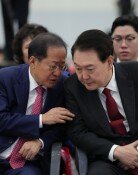Halt to S. Korea-U.S. joint drills raises concern over weakened defense posture
Halt to S. Korea-U.S. joint drills raises concern over weakened defense posture
Posted June. 14, 2018 07:26,
Updated June. 14, 2018 07:26
If the United States halts joint military exercises with South Korea as U.S. President Donald Trump told a news conference following his summit meeting with North Korean leader Kim Jong Un, the cease will likely send significant shockwaves to the security of the Korean Peninsula and the power balance in Northeast Asia. Above all, the halt could weaken the wartime operational capabilities of the South Korea-U.S. combined forces. The core parts of the Key Resolve and the Ulchi Freedom Guardian exercises involve having the South Korea-U.S. combined forces to master how to counter North Korea’s nuclear or conventional provocation in accordance with an operational plan and the deployment procedures of the U.S. reinforcement troops.
Major and field commanders of the South Korean and United States are replaced almost every couple of years. They need to practice coordination through annual joint military exercises to stay fully prepared for emergency situations. North Korean nuclear and missile bases, equipment and facilities get frequently relocated or concealed. The joint exercises also involve tracking such “key targets” and remove them in the shortest time possible in wartime. The cessation of such exercises would leave holes in the defensive posture against the North’s nuclear and missile provocations. It is also possible that the halt will lead to significant reduction or suspension of the deployment of U.S. strategic assets to South Korea.
North Korea and China have called the South Korea-U.S. alliance as a “remnant of the Cold War.” They claim Washington has huge U.S. military presence in South Korea and conduct annual joint military exercises to escalate tensions on the peninsula, even though the Chinese troops pulled out from the North. Therefore, halting the joint military exercises could end up justifying such an argument by Pyongyang and Beijing.
“If the halt to the military exercises continue for an extended period, the North and China would decide that it could weaken the status of the U.S. Forces Korea and naturally lead to its troop reduction or withdrawal,” said a South Korean military official. Some observers say that China would benefit the most from suspended South Korea-U.S. joint military drills, as the realization of China’s call for simultaneous stopping of the North Korean nuclear and missile program and South Korea-U.S. military exercises could strengthen Beijing’s voice over the situation on the Korean Peninsula.
Sang-Ho Yun ysh1005@donga.com







